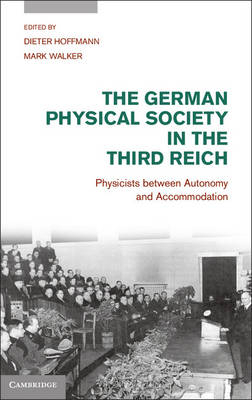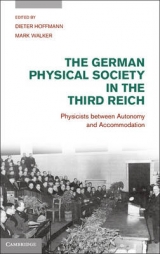The German Physical Society in the Third Reich
Cambridge University Press (Verlag)
978-1-107-00684-3 (ISBN)
This is a history of one of the oldest and most important scientific societies, the German Physical Society, during the Nazi regime and immediate postwar period. When Hitler was appointed chancellor of Germany in 1933, the Physical Society included prominent Jewish scientists as members, including Fritz Haber and Albert Einstein. As Jewish scientists lost their jobs and emigrated, the Society gradually lost members. In 1938, under pressure from the Nazi Ministry of Science, Education and Culture, the Society forced out the last of its Jewish colleagues. This action was just the most prominent example of the tension between accommodation and autonomy that characterized the challenges facing physicists in the Society. They strove to retain as much autonomy as possible, but tried to achieve this by accommodating themselves to Nazi policies, which culminated in the campaign by the Society's president to place physics in the service of the war effort.
Dieter Hoffmann is a Senior Fellow at the Max Planck Institute for the History of Science and a Professor of History of Science at Humboldt University in Berlin. Hoffmann has co-authored two books in English: Science under Socialism: East Germany in Comparative Perspective (1999) and The Emergence of Modern Physics (1996), as well as several books published in German. Hoffmann is a member of the editorial boards for journals Physikalische Blätter and Physics in Perspective. His articles have appeared in Physics in Perspective and Physics Today. He is a member of the German Physical Society; the German Society for the History of Science, Technology and Medicine; and the History of Science Society. Mark Walker is the John Bigelow Professor of History at Union College. He is the author of Nazi Science: Myth, Truth, and the German Atom Bomb (1995) and German National Socialism and the Quest for Nuclear Power, 1939–1949 (Cambridge University Press, 1989). He has co-authored several books, including The Kaiser Wilhelm Society under National Socialism (Cambridge University Press, 2009), Politics and Science in Wartime: Comparative International Perspectives on the Kaiser Wilhelm Institutes (2005) and Science and Ideology: A Comparative History (2003). His articles have appeared in the Journal of Contemporary History, Physics Today, Historical Studies in the Natural Sciences, Nature, Physics in Perspective, Minerva and Metascience.
Foreword Eberhard Umbach; 1. The German Physical Society under National Socialism in context Mark Walker; 2. Boundaries and authority in the physics community in the Third Reich Richard H. Beyler; 3. Marginalization and expulsion of physicists under National Socialism: what was the German Physical Society's role? Stefan L. Wolff; 4. The German Physical Society and Aryan physics Michael Eckert; 5. The Ramsauer era and self-mobilization of the German Physical Society Dieter Hoffmann; 6. The Planck medal Richard H. Beyler, Michael Eckert and Dieter Hoffmann; 7. The German Physical Society and research Gerhard Simonsohn; 8. The German Mathematicians Association during the Third Reich: professional policy within the web of National Socialist ideology Volker Remmert; 9. 'To the Duce, the Tenno, and our Führer: a threefold Seig Heil': The German Chemical Society and the Association of German Chemists during the Nazi era Ute Deichmann; 10. Distrust, bitterness, and sentimentality: on the mentality of German physicists in the immediate postwar period Klaus Hentschel; 11. Cleanliness among our circle of colleagues: the German Physical Society's policy toward its past Gerhard Rammer.
| Erscheint lt. Verlag | 5.12.2011 |
|---|---|
| Übersetzer | Ann M. Hentschel |
| Zusatzinfo | 27 Halftones, unspecified |
| Verlagsort | Cambridge |
| Sprache | englisch |
| Maße | 164 x 241 mm |
| Gewicht | 810 g |
| Themenwelt | Geschichte ► Allgemeine Geschichte ► 1918 bis 1945 |
| Geschichte ► Teilgebiete der Geschichte ► Militärgeschichte | |
| Geschichte ► Teilgebiete der Geschichte ► Technikgeschichte | |
| Naturwissenschaften | |
| ISBN-10 | 1-107-00684-8 / 1107006848 |
| ISBN-13 | 978-1-107-00684-3 / 9781107006843 |
| Zustand | Neuware |
| Haben Sie eine Frage zum Produkt? |
aus dem Bereich




